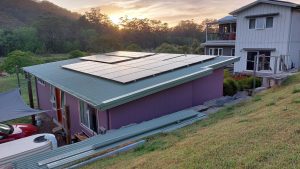 NEV Power was established in 2016 as a wholly owned subsidiary of Narara Ecovillage Cooperative to provide power to all homes within the Narara Ecovillage and the Narara Ecovillage Cooperative itself which includes NEV Water.
NEV Power was established in 2016 as a wholly owned subsidiary of Narara Ecovillage Cooperative to provide power to all homes within the Narara Ecovillage and the Narara Ecovillage Cooperative itself which includes NEV Water.
NEV Power is an R2 exempt embedded energy network and retailer operating under the Australian Energy Regulator regulations. It has a high voltage connection to the national grid supported by a tap change transformer which assists in maintaining reliable voltage across the network.
If you are looking for information on how to setup your account and our current tariffs and policies please scroll to the bottom of this page.
As at the start of 2024 NEV Power had 57 customers plus 11 metered services to the NEV Cooperative. We are now about halfway to our final projected customer numbers.
Our primary mission is to maximise the supply and utilisation of renewable energy and to provide the highest level of power resilience to all our customers. In doing so NEV Power supports the overall Vision Mission and Aims (VMA) for the ecovillage.
Increasing customer base.
Narara Ecovillage has recently completed the subdivision of Stage 2. There are also a small number of Stage 1 lots which have not yet completed construction. NEV Power expects the customer base to grow to 90+ houses within 3 years. The final customer size will be around 110-120 customers.
Connection to the grid
When formed, NEV Power decided to be connected to the wider grid (Ausgrid) and chose a High Voltage connection as the company expected to have high levels of surplus power to export but relatively low consumption of grid power.
NEV Power has a contract with Shell Energy as a wholesale energy provider. The recent changes in the energy market have meant higher tariffs and the effective loss of feed in rates applied in 2022.
Solar power
The Narara Ecovillage building standards require all owners to have sufficient solar power installed to meet their overall energy needs plus an allowance to compensate for the energy embedded (used) in their construction. This equates to a minimum 4 kW solar power for a 3-bedroom family home. Most owners have installed much larger solar power systems and the overall average is now about 7 kW per house. As a consequence, NEV Power is generally a net daily exporter of over 1,000 kWh (1megawatt) /day into the national grid.
NEV Power expects that new households will continue to invest in larger solar systems partly because of the relative low cost but also to meet the needs of the expected move to electric vehicles (EV’s).
Ausgrid has approved maximum inverter capacity / export limit of 999 kVA for the NEV Power grid connection. This includes the 270 kVA capacity of our community battery, leaving about 730 kW available for households. When we grow to over 90 households, we expect to reach this external Ausgrid limit. In the shorter term we are already experiencing quite high levels of export from customers’ solar inverters.
This opens us up to the risk that in the event of a grid disconnection (e.g. if Ausgrid’s grid goes down) the excess solar energy in our network may exceed the capacity of our community battery’s inverter. NEV Power has already taken short term measures to minimise this risk and is working on longer term solutions to control excess power across the network. This may involve some curtailment of power produced by individual house solar inverters.
Battery Energy Storage System (‘BESS’)
In 2020 NEV Power invested in a community battery supplied by ABB Hitachi and assisted by a grant from ARENA. The battery has a 430-kWh usable capacity and stores some of the excess power generated by household solar systems. The battery is used to supply power across the network when solar power generation is limited by weather or at night-time. The storage capacity has proven sufficient to avoid using grid supplied power on approximately 75% of days.
As the number of customers grow, our ability to meet overall increased energy demand will become more constrained. NEV Power has determined that it will not be economically beneficial to customers to expand our battery capacity. The economics of both industrial and household batteries are still very marginal at current prices. We recognise that other aspects may also influence individual customer choices, so we suggest customers should carefully consider their own situation before investing in their own battery. Several customers (5 to date) have made the choice to invest in their own home batteries. Electric vehicles are rapidly becoming mainstream and especially as vehicle to grid capability (V2G) becomes commonplace, the EV battery will also provide useful back-up for home storage (‘a large battery on wheels’). On average an EV has a 50-100 kWh battery (one to two week’s average house consumption) so potentially that offers a very significant level of storage to the consumer and potentially across the community in the medium term.
Smartgrid functionality
NEV Power has already established a low power community Wi-Fi network which enables the centralised collection of data about power production from customers’ solar inverters and their import from and export to the network at 5-minute intervals. This gives NEV Power unprecedented visibility of power production and consumption across the network.
We are already using this information to provide customers with advice on how to make use of renewable power most effectively across the network and minimise the import of non-renewable grid power.
NEV Power bills according to time of use, based around daytime and night-time power. Night-time power is significantly more expensive as it uses the limited battery storage. Daytime power is only a third the price, as on most days our solar panels produce more than we need and the network has excess daytime power and sends it back to the national grid.
NEV Power has recognised that it lacks sufficient IT skills to leverage our knowledge of customers’ energy production and consumption. Building better databases and increasing our IT skills will be a focus over the next 3 years. We envisage being able to provide customers with real-time warnings which will enable them to tune their energy consumption. We will also be encouraging customers to introduce their own control systems.
Electric Vehicles (EVs)
This is likely to drive the biggest change in our customers’ consumption over the coming years. We expect that within 3 years, most customers will have access to at least one EV (many through our EV Car share scheme). This will have a positive impact on energy storage, especially when vehicle to the grid (V2G) becomes mainstream.
In 2024 we received a NSW grant which helped us install 3 new 22kW chargers, available to the public on the Exploren network (you’ll find the locations on Plug-Share and Google maps).
Overall, we do expect to be able to manage the increased network power consumption created by lots of EVs because they will not be charging at the same time or from empty to full every day. We anticipate most customers will charge at home and will therefore firstly draw on their own daytime power (which will cost them nothing). We do not anticipate that this increased usage will significantly limit our ability to continue to fully recharge the community battery every day.
Financial viability
NEV Power has found it difficult to balance the need to generate sufficient revenue to cover costs whilst also maintaining a competitive tariff structure. It has become harder as the value of excess daytime solar power has diminished. We now offer our customers a very low feed in tariff of 1c kWh, though we receive almost zero from our HV energy supplier for excess daytime solar power.
The growth in our customer base will assist in improving our economic viability from an increased number of fixed charges as well as increased energy sales.
We are continuing to examine opportunities to leverage the power stored in our BESS potentially by executing a FCAS contractor. This would improve our financial position and allow NEV Power to maintain reasonable tariff parity with external competition. The cash surpluses will be used to repay the accumulated debt incurred during the first 6 years of trading. However, we anticipate it will take at least 10 years to repay both the loans provided by NEV Cooperative and the loans provided by Co-op members to assist in the purchase of the community battery. NEV Power will undertake some more detailed power modelling to understand the overall growth over the next 3-5 years.
Energy trading and Virtual Power Plants (VPP)
A future opportunity that is being investigated for possible implementation at NEV is Virtual Power Plants (VPPs), see https://en.wikipedia.org/wiki/Virtual_power_plant. This would enable NEV Power to aggregate NEV’s excess solar output and battery power and make it available to trade on the open energy market – buying excess power if necessary to fill up the battery and selling power when high demand raises wholesale prices well above normal. Home PV and battery systems are normally too small to be able to participate in the National Energy Market and the effort required in tracking it and trading is too onerous. But should NEV Power establish or join an existing VPP then these administrative functions would be done on individual members’ behalf by expert software. Once stage 2 is completed, NEV Power could potential earn $50,000 to $80,000 a year or more on members’ behalf through a VPP.
Expanding NEV Power’s domain
The NEV Power team feel that, although the energy playing field is changing fast and each member’s situation is somewhat unique, there is an opportunity to provide more advice to members in areas such as
- Electric Vehicles
- EV car charging options.
- Home batteries
- Energy saving solutions for the home.
- Maximising energy efficiency and use and minimising energy costs.
Who do I contact if there is an emergency?
For all life-threatening emergencies: Dial 000 for Ambulance, Fire Brigade or Police.
What do I do if I have lost power?
If you have lost power to your home please first check if the circuit breakers in your power board have tripped. This may have been caused by a faulty appliance. If this does not seem to be the problem or you are at all uncertain we encourage you to immediately report your problem to NEV Power by calling 02 4328 1588. If you make the call outside of normal business hours you may be redirected to an emergency response number.
General contact information
NEV Power understands that from time to time customers may experience unexpected issues with their electricity supply.
For all power issues – Contact NEV Power on (02) 4328 1588 or email NEV Power on [email protected].
For urgent issues relating directly to the mains electricity supply – Contact AUSGRID on 131388.
Navigating the NEV Power website
The NEV Power website contains information to assist customers in setting up and managing your electricity services.
Customer Information – Provides all the information you need to setup and manage your account with NEV Power. It includes information on prices, payment options, understanding you bill and reporting a fault or raising a concern.
Energy saving tips – explains how you can take charge of your energy consumption to maximise energy efficiency, reduce the cost of your electricity and maximise your contribution to a sustainable future.
Trade support – provides information for your builder or electrician
Policies & forms – provides a summary of all our policies and the forms you may need to use.




